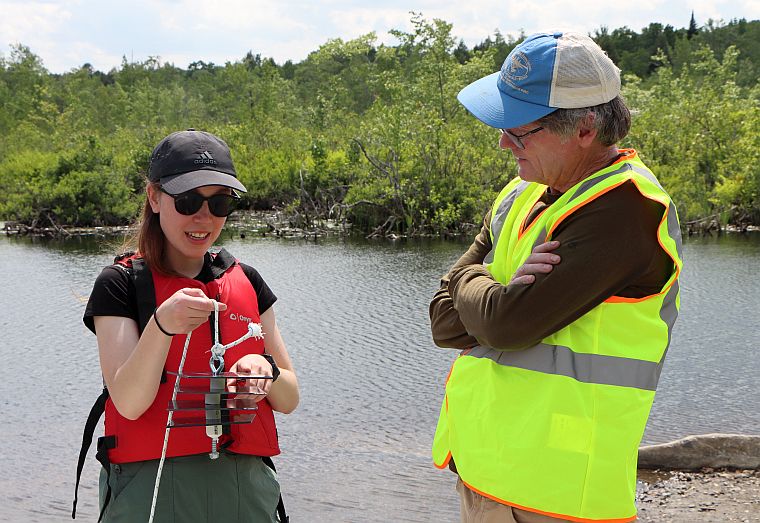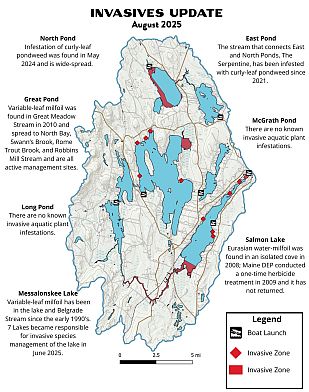
A Watershed Approach to Lake Protection

Lakes are often treated as isolated ecosystems — individual waterbodies bounded by shorelines and governed independently. However, this perception fails to recognize the true nature of freshwater systems, as lakes are integral components of broader watershed networks, influenced by the land, rivers, tributaries, and human activities. Acknowledging this interconnectedness is critical when managing invasive aquatic species (IAS), which move freely across watershed boundaries and require coordinated, preventative measures and remediation responses.
Invasive aquatic species, such as milfoil, zebra mussels, or curly-leaf pondweed, do not respect town lines or lake associations. These species spread through natural water flow, animal vectors, and, most commonly, human activity — especially recreational boating. A contaminated boat trailer moved from one lake to another can establish a new infestation that, once introduced, is nearly impossible to eradicate. Given their ability to spread rapidly and widely, IAS management must adopt a watershed approach rather than relying on lake-by-lake interventions.
A watershed approach fosters collaboration between diverse stakeholders, including municipalities, lake associations, and state agencies. Here in the Belgrade Lakes Watershed, 7 Lakes Alliance works closely with all the above to coordinate IAS prevention and response efforts across the entire watershed.
In addition to our statewide Courtesy Boat Inspection (CBI) program, 7 Lakes is participating in a monitoring effort to detect invasive zebra mussels. Zebra mussels are filter feeders of important food and nutrients that native organisms require, negatively impacting all native fish and wildlife in the waterbody. Additionally, they damage infrastructure by encrusting water equipment and intake pipes. Unlike native mussels, zebra mussels attach to hard surfaces in the water, including watercraft, which makes them easily susceptible to being spread between waterbodies.
Early detection of zebra mussels is crucial in preventing further spread and mitigating their impacts if they become established here. This is why 7 Lakes Alliance is participating in the Maine Department of Inland Fisheries & Wildlife’s (MDIFW) zebra mussel settling plate community science project in response to nearby infestations of invasive zebra mussel in the Saint John River. These settling plates have been deployed at high-use sites on all seven of our lakes and are checked every two weeks to see if zebra mussels are attached. So far this season, we have not found any zebra mussels on the settling plates.

On a finer scale, watershed partnerships are essential for sharing technical expertise, mobilizing resources, and deploying a unified response that can outpace the spread of invasive species. A notable example of such a partnership is the ongoing rapid response effort to contain curly-leaf pondweed in North Pond. Curly-leaf pondweed is now found scattered throughout North Pond, in deep water, and up to 300 feet from shore. North Pond is a shallow, high nutrient lake, which means invasive plants like curly-leaf can quickly take over.
With over 2,225 acres of suitable habitat to survey, we need as many eyes as possible looking for curly-leaf. Volunteers of North Pond Association have contributed countless hours of survey, sharing GPS locations with 7 Lakes’ certified divers, for an expedited rapid response. To get involved with the fight against curly-leaf pondweed, please email sharon.mann@7lakesalliance.org.
In short, managing invasive aquatic species requires recognizing that lakes are part of larger, dynamic systems. Effective control and prevention must occur at the watershed level, not within isolated lake boundaries. By adopting an integrated, watershed approach, communities can protect freshwater ecosystems more effectively and build regional resilience to the growing threat of invasive aquatic species.
Sharon Mann is the Invasive Aquatics Program Director for the 7 Lakes Alliance.
zebra mussels, curly leaf pond weed, invasive plants
Download Full Newspaper: High Res | Low Res (Details…)
<— Previous Article • Summaries • Next Article —>
©2025 by Summertime in the Belgrades. All rights reserved.